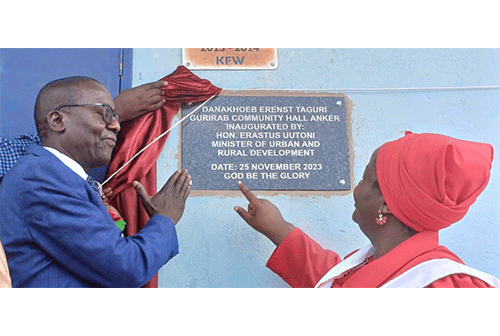OSHAKATI – Minister of Urban and Rural Development Erastus Uutoni said he was disturbed by disputes within some of the traditional communities that have “really” reached an alarming rate.
Uutoni was speaking at the inauguration of the |Gaio-Daman Traditional Authority head office and Ernst Taguri Gurirab Community Hall at Anker in the Kunene region on Saturday.
He reminded traditional authorities that disputes that are not resolved on time result in costly conflicts, derail focus from serving the people, and disturb peace and stability in the communities as well.
“This counterproductive attitude delays development which greatly disadvantages community members of service delivery; as it is said, when two elephants fight, the grass suffers,” he said.
Uutoni added that they should, by all means, avoid disputes and resolve any disturbing issues, and urged the entire |Gaio-Daman Traditional Authority to always stand firm, unite and work together in the interest of the traditional community.
Further, Uutoni indicated that as a traditional authority, they should hear and settle disputes between the members of the traditional community in accordance with the customary law without resorting to the court of law.
He reiterated that their actions as traditional leaders must be inclusive and people centred, and this should be that as leaders, they must periodically consult with and obtain the views and consensus of and also involve the community in the planning and implementation of development initiatives that affect and/or are meant to benefit them.
Moreover, Uutoni explained that traditional authorities have a major role to play in addressing social, economic, and legislative matters.
Similarly, Uutoni stated that traditional leaders are pillars of Namibian society as they play a fundamental role in maintaining and sustaining the norms and principles in traditional communities.
“You are the custodians of their traditional customs and values, serving as their substance of cultural inheritance that defines their very characteristics and the purpose of their existence,” he said. -Nampa


